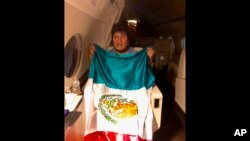Updated: Nov. 12, 1:20PM
THE WHITE HOUSE — Former Bolivian President Evo Morales arrived Tuesday in Mexico, where he has been granted asylum.
Foreign Minister Marcelo Erbrad had posted a picture of Morales onboard a Mexican air force plane, displaying a Mexican flag across his lap, as it departed La Paz Monday night. "Your life and integrity are safe," Erbrad tweeted.
Morales requested asylum in Mexico hours after he abruptly resigned from office Sunday in the wake of mass protests over last month's disputed presidential election, which ended with him being declared the winner after partial results had predicted he would face a December runoff against former President Carlos Mesa, his main rival.
Late Monday, Morales tweeted he was on his way to Mexico and was "grateful for the openness of these brothers who offered us asylum to protect our life. It hurts me to leave the country, for political reasons, but I will always be concerned. I will return soon, with more strength and energy.''
The United States government is applauding the Morales's resignation, rejecting assertions by several countries, including Mexico, that he was forced out by a coup.
U.S. President Donald Trump, in a statement, called Morales’ departure “a significant moment for democracy in the Western Hemisphere. After nearly 14 years and his recent attempt to override the Bolivian constitution and the will of the people, Morales’s departure preserves democracy and paves the way for the Bolivian people to have their voices heard.”
The White House statement adds that the events in Bolivia “send a strong signal to the illegitimate regimes in Venezuela and Nicaragua that democracy and the will of the people will always prevail. We are now one step closer to a completely democratic, prosperous, and free Western Hemisphere.”
A senior State Department official told reporters on a conference call on Monday afternoon that Washington does not consider the resignation of Morales the result of a coup, but rather it is an expression of the Bolivian peopled fed up with government ignoring its will.
“There were protesters from all walks on life,” said a senior administration official, denying that it was mainly the Bolivian middle class on the streets demanding Morales’ ouster. “It’s probably a little bit simplistic to boil this down to class or perhaps ethnicity in a complex set of circumstances.”
A senior U.S. official added, that “there’s been too much violence on both sides.”
Some of Morales’ ministers and senior officials who stepped down are also seeking refuge in the Mexican ambassador's residence.
At the request of a number of nations, including the United States, Brazil, Canada, Colombia and Peru, the Organization of American States on Tuesday afternoon is to hold a special meeting on the Bolivian situation.
Morales stepped down Sunday, hours after he had accepted calls for a new election by an OAS team that found a “heap of observed irregularities” in the October 20 election.
The delayed results of the balloting, which fueled suspicion of vote rigging, indicated Morales received just enough votes to avoid a runoff against a united opposition trying to prevent him from winning a fourth term.
Morales, on Monday, called on the opposition to keep the peace.
According to the Bolivian constitution, the vice president is next in line to take power when the president steps down. The head of the country's Senate is third in line, but both of them, as well as a number of other top ministers, resigned shortly after Morales, leaving a power vacuum.
Opposition leader Jeanine Anez said Sunday she would assume the interim presidency of Bolivia, but Congress must first be convened to vote her into power.
The U.S. government is calling for Bolivia’s legislative assembly to quickly convene to accept Morales’ resignation and follow the constitution to fill the political vacuum.
“What’s important is to reconstitute the civilian government,” said a senior State Department official.
Morales, the first member of Bolivia's indigenous population to become president, announced his resignation on television shortly after the country’s military chief, General Williams Kaliman, called on him to quit to allow the restoration of peace and stability.
Carlos Mesa credits a popular uprising, not the military for forcing Morales to step aside.
The military made a decision not to deploy in the streets because “they didn't want to take lives,” according to Mesa.
Some of Morales's ministers and senior officials who stepped down are currently seeking refuge in the Mexican ambassador's residence.
A high profile freshman opposition member of the U.S. House is also rejecting the Trump administration’s characterization of events in Bolivia.
“What’s happening right now in Bolivia isn’t democracy, it’s a coup,” tweeted Democrat Alexandria Ocasio-Cortez on Monday. “The people of Bolivia deserve free, fair, and peaceful elections - not violent seizures of power.”












